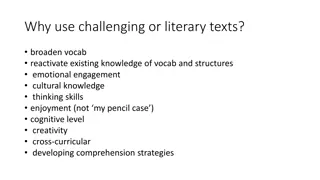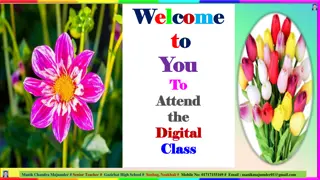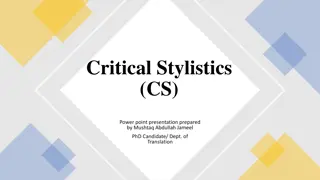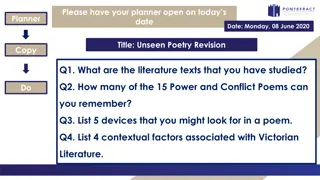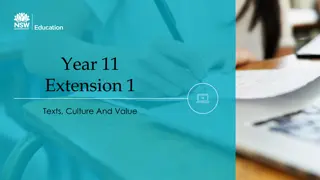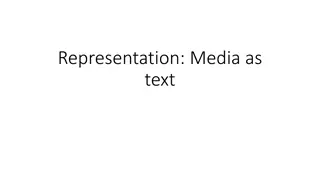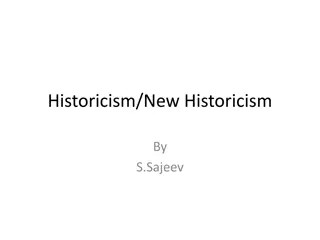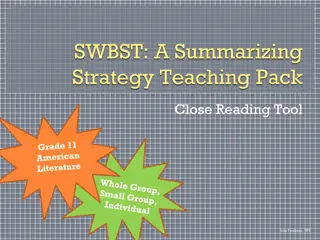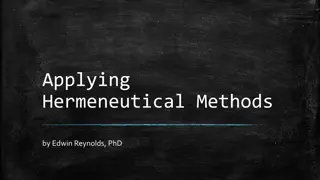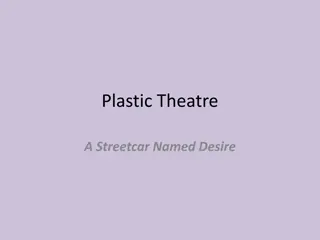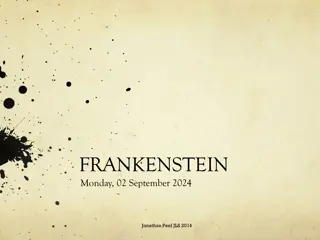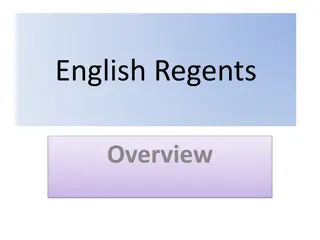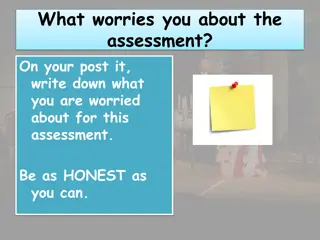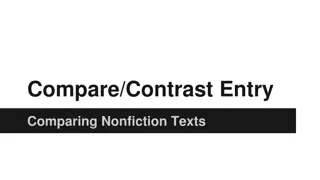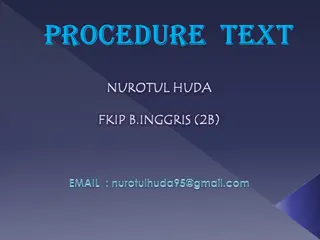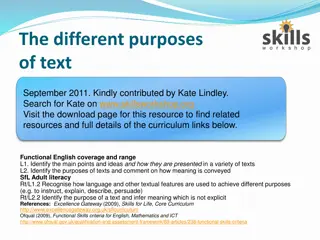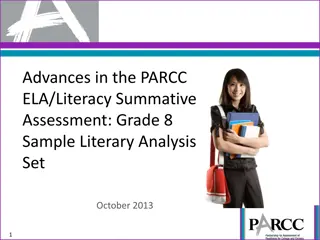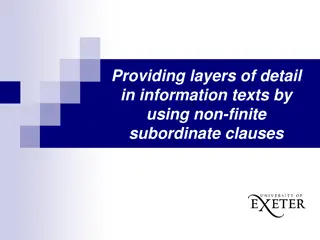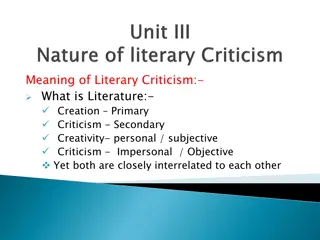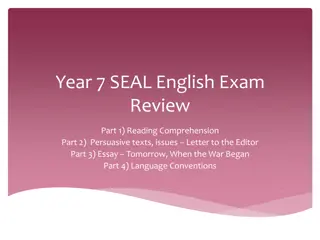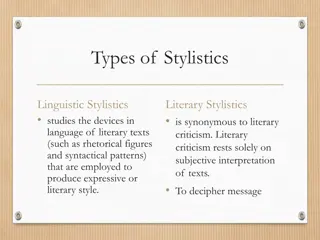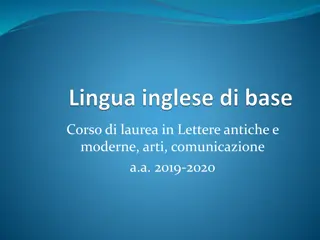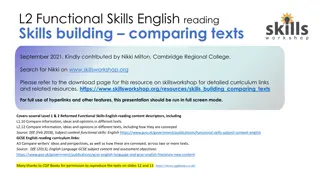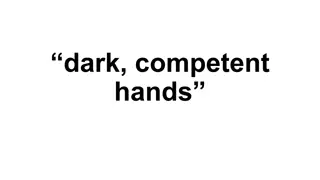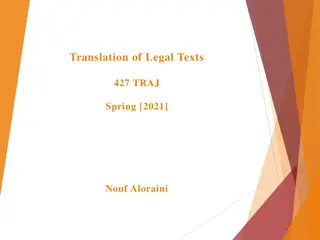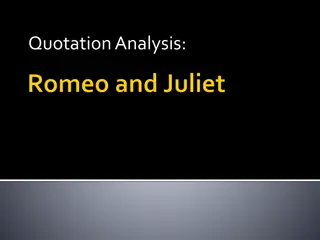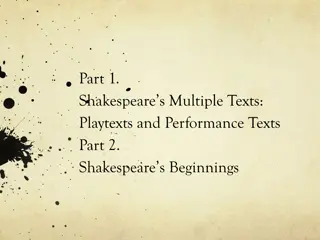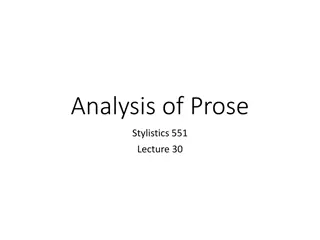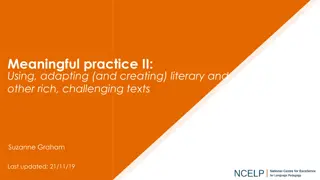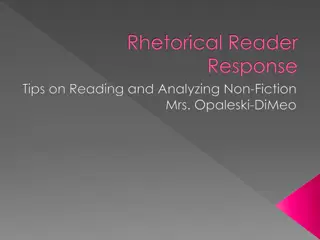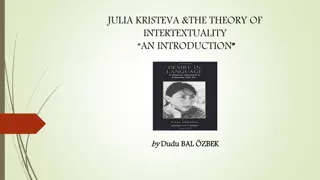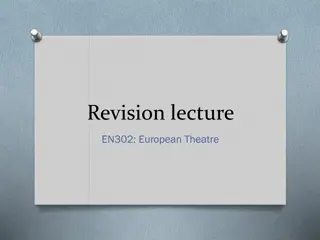Medieval English Texts: Cotton MS Nero A.X/2 and Sir Gawain and the Green Knight
Explore the rich literary realm of Medieval English texts through manuscripts like the Cotton MS Nero A.X/2, containing alliterative poetry in Middle English, featuring works like Pearl, Patience, Cleanness, and Sir Gawain and the Green Knight. Delve into the world of Sir Gawain and the Green Knight
0 views • 27 slides
Enhancing Language Skills Through Challenging Literary Texts
Broaden vocabulary, reactivate knowledge, and engage emotionally with challenging literary texts to develop comprehension strategies, cultural awareness, and cognitive skills. Utilize various media sources and explicit instruction to access more complex texts, fostering creativity and cross-curricul
4 views • 28 slides
Enhancing Literary Appreciation Through Stylistics and Ornamentation
Explore the world of literary texts with Md. Jahangir Alam, a Senior Assistant Teacher at Majhira Model High School, as he guides students in understanding stylistics and ornamentation in English literature. Through experimental learning cycles and activities like analyzing similes, metaphors, and e
1 views • 17 slides
Enhancing Emotional Connection Through Literary Texts
Join Senior Teacher Manik Chandra Majumder at Gazirhat High School to explore Competency 4, focusing on emotionally connecting with literary texts. Engage in expressing personal feelings about literature and learn new vocabulary to enhance understanding. Dive into a world of universal themes and mea
1 views • 46 slides
Understanding Critical Stylistics: Tools and Application
Critical Stylistics (CS) is a method that delves into the ideological underpinnings of texts through the analysis of linguistic features. Developed by Jeffries, CS focuses on uncovering implicit ideologies embedded in texts by examining stylistic choices. By integrating stylistics and critical disco
2 views • 28 slides
Unseen Poetry Revision: Exploring Literary Texts, Devices, and Contexts
Delve into the world of unseen poetry revision by analyzing literary texts, exploring poetic devices, and understanding contextual factors associated with Victorian Literature. Engage in vocabulary challenges, pre-reading activities, and discussions to enhance your understanding of poetry. Enhance y
3 views • 24 slides
Exploring Texts, Culture, and Value Through Appropriation
In Year 11 Extension 1, students delve into texts from the past and their influence on present culture. They analyze the relationships between texts and culture, language's impact on values, and different responses to texts. Through close study, they explore key texts from the past, examining how th
0 views • 9 slides
Mastering Quotations in Literary Analysis
Essays in the Literary Tradition sequence often require interpretive analysis arguments, built from articulate and defendable claims. This presentation by Dr. Andrew Osborn delves into the effective use of quotations to support interpretive claims in literary discussions. Learn how to incorporate em
1 views • 53 slides
Understanding Representation in Media Studies
Representation in media studies refers to how aspects of society such as gender, age, ethnicity, and identity are presented to audiences through media texts. These texts have the power to influence ideas and attitudes by shaping the audience's understanding of important topics. Analyzing media texts
1 views • 19 slides
Essentials of Literary Translation: Understanding the Art and Skill of Interpreting
The process of literary translation involves creativity, cultural understanding, and maintaining the essence of the original text. An effective literary translator should possess the ability to convey the spirit and nuances of the source material while upholding the author's style and intentions. Av
0 views • 25 slides
Understanding Literary Criticism: A Comprehensive Overview
Literary criticism involves the study, evaluation, and interpretation of literature, focusing on themes, styles, settings, and historical contexts. This discipline explores the meanings, workings, and values of literary works through interpretation, analysis, and evaluation. Various types of literar
2 views • 20 slides
Exploring Historicism and New Historicism: Perspectives on History and Literature
Understanding Historicism and New Historicism, this article delves into their definitions, perspectives on history, treatment of literary and non-literary texts, examples, and the emergence of New Historicism in the 1980s. It explores how these approaches unify cultural and social texts, challenge t
0 views • 16 slides
SWBST Summarizing Strategy Teaching Pack Overview
SWBST is a summarizing strategy designed by Julie Faulkner to help readers comprehend texts effectively. It entails breaking down texts into key components: Somebody (main character/speaker/author) Wanted (motivation), But (problem/conflict), So (solution), Then (resolution). The strategy aids in hi
0 views • 18 slides
Comparative Hermeneutics: Understanding Biblical Texts
Explore the application of hermeneutical methods on biblical texts such as Psalm 23 and 1 Tim. 2 through interpretation, translation, and contextual analysis. Delve into the meaning of texts, the role of signs and symbols, and the impact of varying presuppositions on interpretation. Reflect on the p
0 views • 46 slides
GCSE English Literature Exam Overview
This overview provides information on the GCSE English Literature exam structure, content, and assessment objectives for both components. It includes details on the texts studied, such as Shakespeare, poetry, post-1914 prose/drama, and 19th-century prose. Students are assessed on their ability to re
0 views • 23 slides
Exploring Plastic Theatre in Tennessee Williams' "A Streetcar Named Desire
Tennessee Williams introduced the concept of plastic theatre in the 1940s to create a new type of theatrical experience that combined non-literary elements with the literary text. This approach aimed to enhance the themes, characters, and language of the play by integrating elements such as setting,
0 views • 9 slides
Exploring Contextual Ideas in Frankenstein by Mary Shelley
An analysis of contextual ideas related to the study of Frankenstein by Mary Shelley. Delve into the key connotations, connections with other literary texts, and the enduring resonance of a novel written almost 200 years ago. Understand the significance of the contexts in which literary texts are wr
0 views • 57 slides
Comprehensive English Regents Exam Overview
The English Regents exam consists of four parts: Listening Passage, Reading Comprehension, Literary Analysis, and Critical Lens Essay. Part One involves listening to a passage and answering questions. Part Two tests reading comprehension with non-fiction passages. Part Three focuses on analyzing lit
0 views • 10 slides
Literature Assessment: Understanding Modern Texts and Poetry
This assessment focuses on modern texts, poetry, and unseen poetry, evaluating students' ability to analyze literary works and demonstrate understanding. Students must be prepared to write essays and respond to various types of questions within a time limit. Key areas covered include Sheila's charac
0 views • 16 slides
Understanding Functional Styles in Language
The notion of style is explored in language use, including variations in literary and non-literary contexts, register linguistic features, and style-shifting according to formality. Definitions and classifications of style emphasize the distinctive features characteristic of register, genre, or auth
0 views • 30 slides
Analyzing Nonfiction Texts: Comparing Structures and Evidence
Explore how two nonfiction texts, "Watch Your Driving, Kids" and an Allstate Foundation video, present statistics on teen car crashes and propose solutions. Dive into the authors' text organization and credibility, unveiling similarities in the texts' structures and evidence presentation.
0 views • 10 slides
Understanding Procedure Texts and their Structure
Procedure texts are instructional pieces of writing that explain how something works or how to perform a specific activity. They typically consist of three main definitions: texts that explain how to use something, texts that provide instructions for a particular activity, and texts that address hum
0 views • 10 slides
Russian Formalism and American New Criticism Overview
Russian Formalism, a literary movement that emerged in the early 20th century, was a radical departure from traditional approaches to literary analysis. It sought to define literary criticism as a scientific profession, focusing on the autonomy of literature and employing linguistics for support. Th
0 views • 22 slides
Understanding the Various Purposes of Texts
Explore the diverse functions of texts and how they convey meaning, from spooky holiday advertisements to cooking instructions and flu immunization details. Discover how language and textual features are used to achieve different purposes, and learn to identify implicit meanings in texts. Enhance yo
0 views • 9 slides
Grade 8 Literary Analysis Sample Items Overview
This collection provides a detailed look at the Grade 8 Literary Analysis Task, guiding students to carefully analyze two literary texts and write a comprehensive analysis. The included sample items and tasks aim to enhance students' abilities in close reading, critical thinking, and synthesizing id
0 views • 17 slides
Enhancing Information Texts with Non-Finite Subordinate Clauses
Providing layers of detail in information texts involves using non-finite subordinate clauses to establish connections between grammar, meaning, and rhetorical effects. The LEAD principles emphasize linking grammar to writing purposefully, using authentic texts as models, and fostering deep metaling
0 views • 8 slides
Understanding Literary Criticism: Exploring the Art of Interpreting and Evaluating Literature
Literary criticism, rooted in ancient Greek and Roman traditions, involves interpreting, analyzing, and evaluating literary works. It has evolved over time, encompassing various theories and approaches to engage with literature critically. From mimetic theory to analytical criticism, different persp
0 views • 11 slides
Exploring Fantasy Texts: The Raven and Literary Devices
Delve into the world of fantasy texts by analyzing "The Raven" by Edgar Allan Poe. Explore how characters, relationships, and traditional versus contemporary elements are challenged, conveying powerful messages to readers. Consider literary devices like similes, imagery, and personification to under
0 views • 55 slides
Understanding Linguistic and Literary Stylistics
Linguistic Stylistics explores devices in language of literary texts to create expressive styles. Literary criticism relies on subjective interpretation, while Stylistic Analysis in linguistics identifies patterns in speech and writing. This content delves into the phonological, graphological, and l
0 views • 17 slides
Exploring Key Concepts in Narratology Through Literary and Multimedia Texts
This course in ancient and modern letters, arts, and communication delves into essential narrative elements such as story creation, character development, settings, genres, and various media platforms. Through the analysis of literary and multimedia texts like "The Rime of the Ancient Mariner," "The
0 views • 23 slides
Enhancing Reading Skills: Comparing Texts for English Learners
Enhance your English reading skills by comparing texts to identify similarities and differences. Practice analyzing information, ideas, and opinions in different texts, including how they are conveyed. This resource provides exercises and examples to help you develop your ability to compare and cont
0 views • 14 slides
Analysis of Word Choices and Attitudes in Literary Texts
The provided content delves into the representation of characters through word choice and attitudes in various literary texts. It examines the implications behind phrases like "dark, competent hands" and "Mandy got her degree, did she? Dog my cats", shedding light on underlying biases and perspectiv
0 views • 16 slides
Translation of Legal Texts Course Overview
This course provides a comprehensive overview of translating legal texts from English into Arabic and vice versa. Students will explore various types of legal texts, specialized terminology, and resources essential for accurate translation. The course covers the history of legal discourse, emphasizi
0 views • 50 slides
Understanding Quotation Analysis and Literary Terms in Literature
Exploring quotation analysis and literary terms in literature is essential for understanding the deeper meaning and context of literary works. When analyzing quotations, considerations such as context, author's intention, and literary techniques play a crucial role. Additionally, familiarizing onese
0 views • 53 slides
Understanding Shakespeare's Playtexts and Performance Texts
Dive into Shakespeare's world of multiple texts, exploring the nuances between playtexts and performance texts. Discover the collaborative nature of early modern playwriting and the significance of deciphering performance elements in comprehending his works. Unveil the intersection of written words
0 views • 9 slides
Understanding Stylistic Analysis in Literature
Stylistic analysis in literature involves examining linguistic features like lexis, grammar, foregrounded elements, and context to distinguish between literary and non-literary prose. While poetry allows for whole text analysis due to its brevity, prose analysis often focuses on selected extracts fo
0 views • 16 slides
Exploring the Use of Literary Texts in Language Teaching
Delve into the rationale and effectiveness of incorporating literary and challenging texts in language learning. Understand the impact on L2 development, key considerations for successful use, and available research evidence.
0 views • 41 slides
Effective College Reading and Analysis Strategies for Non-Fiction Texts
Enhance your non-fiction reading and analysis skills with these practical tips: prepare yourself mentally before reading, preview the article, highlight key points while reading, monitor comprehension, and summarize the article afterward. Additionally, learn how to create a rhetorical précis to eff
0 views • 19 slides
Julia Kristeva & the Theory of Intertextuality: An Introduction
In this introduction to Julia Kristeva's theory of intertextuality, we explore her concept of texts as intersections of various writings rather than fixed points of meaning. Kristeva argues that texts are composed of prior existences, forming a mosaic of quotations and transformations. Intertextuali
0 views • 25 slides
Exam Rubric and Guidelines for European Theatre Module
The content discusses important information regarding the exam rubric for the European Theatre module, including guidelines on time limits, permitted topics, penalties for violations, and advice on handling exam questions. It clarifies rules on writing about the same texts as in coursework essays, s
0 views • 29 slides

